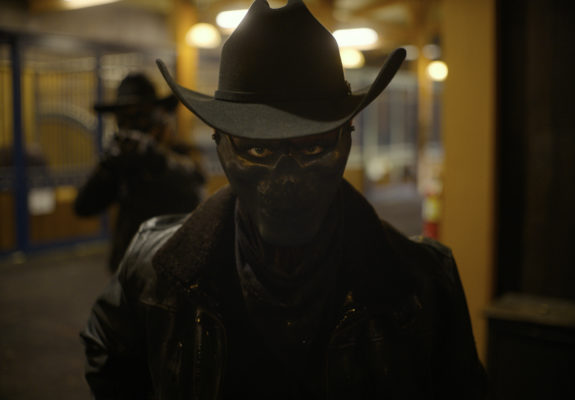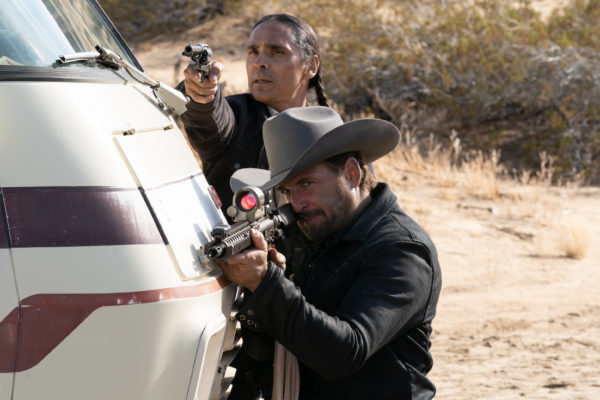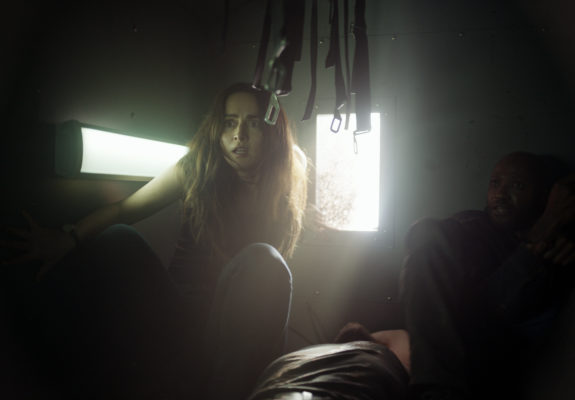
After five films and two seasons of television, it’s the end of the road for The Purge franchise (for now).
With the release of The Forever Purge, one of the defining horror franchises of the 2010s comes to an end. Although the series is often overlooked in discussions of popular franchises, writer/creator James DeMonaco’s work has been a consistently reliable performer for Blumhouse. Add to this The Purge’s explicit focus on race and class and the series is easily among the most topical and politically-aware films in the genre. Complaints that the commentary is too heavy handed and on the nose have plagued The Purge, but there’s something comforting in the knowledge that each new entry will always deliver a sharp and pointed critique of American patriotism.
This has never been more true than the final entry in the series, titled The Forever Purge. Set an indeterminate amount of time after 2016’s Election, the opening montage clarifies that the New Founding Fathers, the franchise’s villains, have reinstated the annual Purge Night, when all crime (even murder) is legal for 12 hours. The events come in the wake of political unrest and division, primarily around the topic of immigration, which is introduced in a pre-title sequence as husband and wife Adela (Ana de la Reguera) and Juan (Tenoch Huert) illegally cross the Mexican border into the United States.
Like all films in the franchise, a handful of characters are used as a representative stand-ins of the larger political debate; in this case, it’s Adela and Juan, as well as Juan’s friend T.T. (Alejandro Edda). The latter pair work as ranch hands on Caleb Tucker (Will Patton)’s property, which is overseen by Caleb’s son Dylan (Josh Lucas), who doesn’t approve of Mexican labourers, unlike his more progressive pregnant wife Cassie (Cassidy Freeman) and sister, Harper (Leven Rambin).
Unlike other entries, The Forever Purge only briefly touches on the annual Purge. The entire core cast survives the night, but as residents attempt to move on with their lives, an uprising of “Forever Purgers” incite a fresh wave of violence against anyone who is perceived to be un-American (ie: anyone who is not white and their sympathizers, such as the Tucker farm, who employs Mexican workers).
When armed Purgers attack the property, everyone is forced to band together and hit the road. As the chaos escalates and the state becomes increasingly inhospitable, the survivors flee for the Mexican border, which has opened its doors to American refugees for a fixed six hour period. This also lends the film a unique aesthetic from its predecessors, as the journey from the city to the Texas countryside adopts the visual iconography of a Western film.

The Forever Purge’s biggest obstacle is that it lacks a central character to root for. There is no Ethan Hawke or Frank Grillo equivalent here: the film’s attention is divided between Lucas’ Dylan and Huert’s Juan as they come to a begrudging understanding that they need to work together in order to survive.
Early in the film, Dylan explicitly states that he doesn’t want a Mexican nanny for his unborn child because he doesn’t want them raised hearing Spanish. Juan, meanwhile, bristles at his wife’s assimilation into American life, resisting the need to become fluently English and daydreaming about their old life in Mexico. Naturally the two men do not see eye to eye.
From a traditional character motivation and narrative perspective, DeMonaco’s choice to focus on the conflict between the men makes sense. The issue is that The Forever Purge doesn’t put in the time or effort to make the audience invest in their issues (problematically the film seems afraid of classifying Dylan as a bad man). The result is that the majority of the film hangs on empty conflict that isn’t engaging.
More importantly, neither character is up to the task to lead the film. The best character is de la Reguera’s Adela: not only is her character’s back story the most interesting, but the actress has an innate charisma that regularly pulls focus when she is on screen. Alas The Forever Purge is too fixated on the Dylan/Juan dynamic to properly use de la Reguera’s talent, which is a shame.

Compared to previous entries, the film also lacks memorable set pieces. The most impressive sequence is a fake one long-take across war torn streets, through a diner and into an abandoned theatre (showing – what else? – Dracula, which is all about the fear of a foreign Other). It’s a great showy moment for director Everado Gout and cinematographer Luis David Sansans.
Overall the film excels at what the previous Purge films have done: overtly criticize the blind patriotism that favours the rich, the white, and the Conservative at the expense of the poor and the marginalized. There is no shortage of refrains about what a “true American” looks like as Black and Mexican characters are targeted for death and suburban houses are lit ablaze. (At one point a man emblazoned with a Nazi tattoo describes a series of gunshots as “American music”).
One telling exchange occurs when Dylan asks why Chiago (Zahn McClarnon), an Indigenous coyote, is helping them:
“It’s not your fight” Dylan, the casual racist, wonders.
Chiago responds: “we’ve been fighting this fight for the last 500 years”.
If this elicits a groan, The Forever Purge is likely too heavy handed for you. If, however, your response is a begrudging nod or “yeah, ok”, then you’re good to go.
3/5
The Forever Purge is playing in theatres July 2, 2021.
Saw ” The Forever Purge”.It isndeeply violent,futuristic and. relevant
Amerikkka yes Slavery
Jim Crow amd Lynching is apart.pf the Amerikkkam tradition. Yes Purge is another name,along with Holocaust